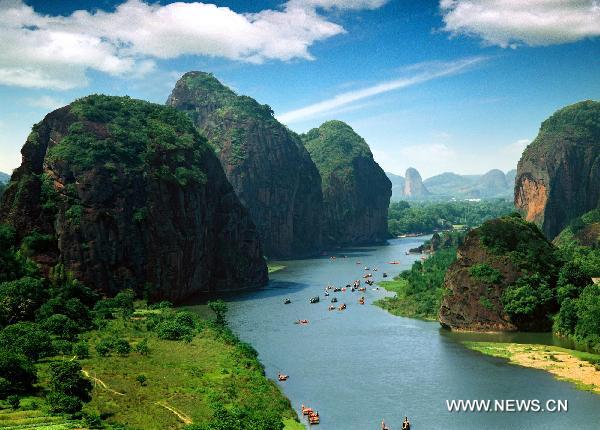Geographic wonder a heritage site
|
|
|
File photo shows scenery of Mountain Longhushan in east China's Jiangxi Province. The World Heritage Committee decided to include China Danxia Landform in the World Heritage List at its 34th meeting being held in Brasilia, capital of Brazil, on Aug. 1, 2010. The six Danxia landform areas are: Mountain Langshan (Hunan Province), Mountain Danxiashan (Guangdong Province), Taining (Fujian Province), Mountain Longhushan and Guifeng (Jiangxi Province), Chishui (Guizhou Province), Mountain Jianglangshan (Zhejiang Province). [Xinhua] |
Shan Jixiang, chief of the State administration of cultural heritage, said urbanization may conflict with the protection of natural heritage.
Shan said heritage protection faces a dilemma, as building houses and developing infrastructure in cities calls for more demolition and construction.
There are previous cases of heritage sites being deleted from UNESCO's list due to local development.
Germany's Dresden Elbe Valley was put on the World Heritage List in 2004, as people could see magnificent buildings built in the 18th to 19th centuries along the riverside. But the local government planned to build a modern bridge across the valley despite UNESCO's opposition. In 2009, it was deleted from the list, because "the property failed to keep its outstanding universal value as inscribed," according to the official UNESCO website.
He Shuzhong, founder of the Beijing Cultural Heritage Protection Center, said the local government strengthens the protection of World Heritage Sites, but that is not the key point of heritage protection ef-forts.
"The protection of cultural and natural heritage is not only a concern of the government, but also an issue that all the public should pay attention to," he said.
Jing Feng, director of the Asia-Pacific regional department at the World Heritage Committee of UNESCO, said China has sped up heritage-protection efforts in its applications for World Heritage Site recognition.
Although economic interests are a major concern of many countries in heritage application, there are countries that consider it as a kind of self-identity of their own cultures, Jing said.
 0
0 








Go to Forum >>0 Comments